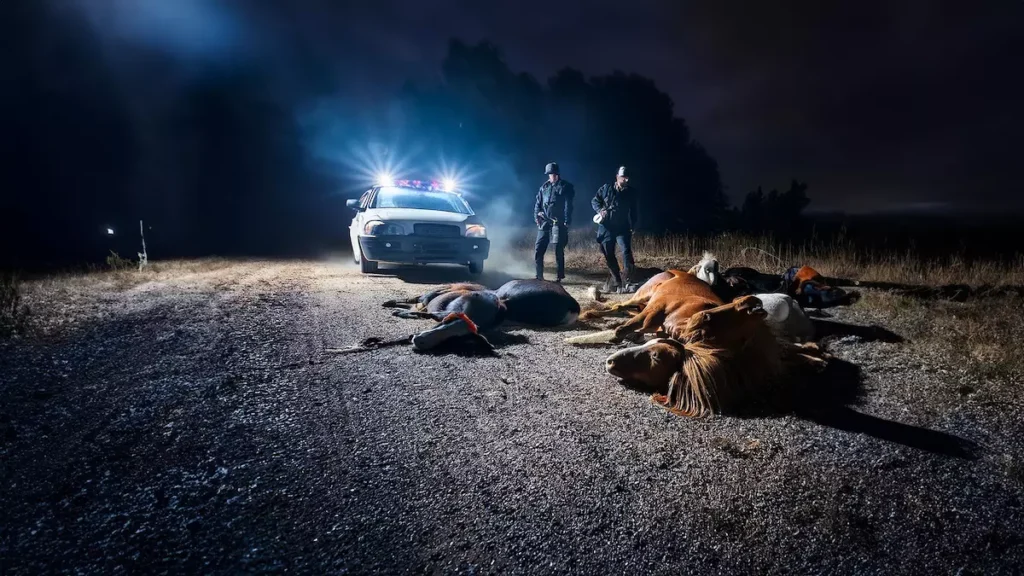Malicious acts of cruelty often an indicator that other acts of mass violence are in the waiting.
Prunedale, CA — Animal advocates reacted with a blend of grief and outrage after learning of the details of a mass shooting in Northern California that left 81 animals dead, warning authorities to treat the outburst of violence with the utmost seriousness.
Acts of malicious cruelty are very often a precursor of violent outbursts aimed at people. Treating this case as anything but an extreme act of social violence, they warned, and not seeking long-term mental health treatment and incarceration for offenders will put other animals and people at risk.
The reaction comes after Vicente Arroyo, 39, pleaded not guilty to multiple charges, including animal cruelty, following a shocking three-hour shooting spree in Prunedale, where he is reported to have killed 81 animals, including miniature horses, goats, and chickens — all belonging to other people and regarded as pets by their caretakers. Arroyo was arrested by Monterey County deputies after reports of gunfire were received early Tuesday morning. Upon arrival, deputies could hear shots being fired, prompting a shelter-in-place order for the surrounding area.

“We grieve for those animals and the people who loved them,” said Wayne Pacelle, president of Animal Wellness Action and the Center for a Humane Economy. “At the same time, we remind the nation that incidents involving malice, torment and killing of animals are often precursors to acts of violence against people. This was a gory and grisly slaughter of innocents, and it is an unmistakable signal that the individual is capable of even more savage acts.”
Authorities found Arroyo in his camper adjacent to the animal lot and recovered numerous firearms, including an illegal AK-47 and more than 2,000 rounds of ammunition.
According to news reports, Arroyo’s family had reached out to various county agencies to get help for him but that “unfortunately, he did not receive that mental health help in time before this tragic incident.” Following the court appearance, Arroyo’s attorney expressed concerns about his mental competency, requesting a mental health evaluation. The judge approved the request, ordering Arroyo to undergo evaluation while he remains in custody on $1 million bail.
The link between mental illness and animal cruelty is a complex and multifaceted issue that has garnered significant attention from researchers, animal welfare advocates, and mental health professionals. Here are a few key aspects of this relationship:
- Indicators of Psychological Distress
Individuals who engage in animal cruelty often exhibit signs of psychological distress or mental illness. - Empathy Deficits
Many individuals who commit acts of animal cruelty may display a lack of empathy or emotional connection to others, including animals. - Cycle of Violence
The “cycle of violence” theory posits that individuals who experience or witness violence may be more likely to perpetrate violence themselves, including animal cruelty. This cycle can be exacerbated by mental illness, where individuals may internalize aggressive behaviors as a coping mechanism. - Criminological Studies
Studies show that many individuals who commit animal cruelty also have a history of other violent behaviors. - Interventions
Early intervention, such as counseling and educational programs about empathy toward animals, can help mitigate these behaviors.
“Cases like this one should be jarring to every American,” said Drew Edmondson, a former county prosecutor, a four-term Attorney General of Oklahoma, and co-chair of the National Law Enforcement Council of Animal Wellness Action. “This case must be handled with diligence and resolve. To be sure, the individual who committed these awful acts cannot be provided with freedom to range nor to have access to firearms or other weapons.”
- The Columbine shooters, Eric Harris and Dylan Klebold, bragged about mutilating animals before turning their weapons on classmates and killing 13 of them.
- Among the about two dozen mass shootings that have each led to 10 or more deaths since Columbine, experts remind us about similar backstories: shooters with a history of animal torture and abuse.
- Payton Gendron, who was arrested for the Buffalo, N.Y., supermarket shooting that killed 10 people, had previously stabbed and decapitated a feral cat, according to several news reports.
- Salvador Ramos, the 18-year-old who massacred 19 children and two teachers in a school in Uvalde, Tex., allegedly boasted to friends that he enjoyed torturing animals and had live streamed his acts of violence.
“Acts of malicious animal cruelty are red flags for parents, teachers, law enforcement, and policy makers. When we ignore them, we imperil the safety of our communities,” said Josh Marquis, a four-term county prosecutor in rural Oregon and co-chair of the NLEC with General Edmondson.

